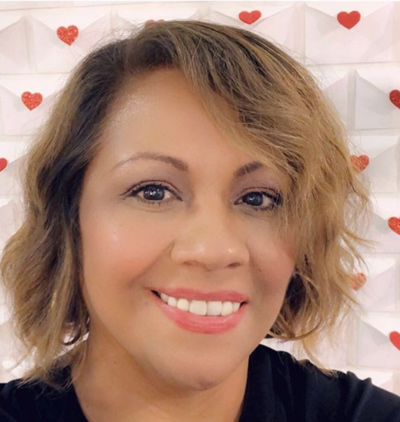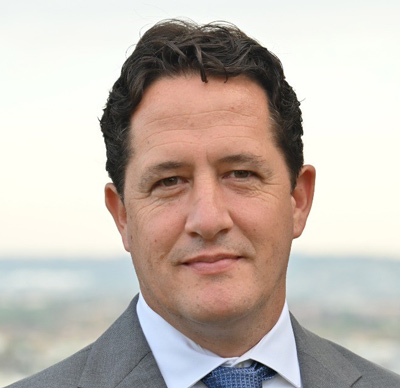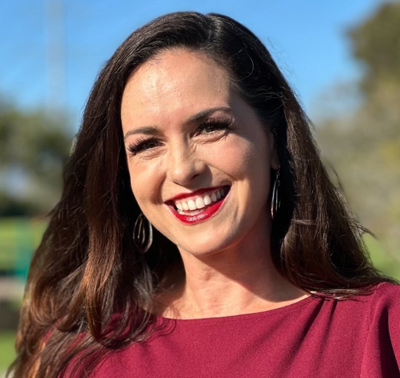Latina Lawyer’s Memoir About Abuse Exposes High-Profile Lawyer Ex-Husband

By Arturo Castañares
Editor-at-Large
A Latina lawyer has written a memoir that details her suffering and recovery from abuse at the hands of her ex-husband, who she says has been protected and supported by local Democrats, labor union leaders, and political activists who publicly advocate supporting women’s rights, yet they did nothing to stop the abuse she faced.
Dovie King, an Ivy League-educated public interest lawyer who recently returned to San Diego after having moved to Boston with her son to get distance from her abusive ex-husband, is now exposing the details of years of physical, psychological, and financial abuse at the hands of her lawyer ex-husband, who she does not name in the book.

Dovie King
King, who is still under a non-disclosure agreement (NDA), simply refers to her ex-husband as “Asshole” throughout the book.
La Prensa San Diego has confirmed through legal documents that King's ex-husband is local attorney Ricardo Ochoa.
King writes that “survivors have many reasons for not naming their perpetrators: legal, blowback, cultural retaliation, personal safety, or simply because the fallout isn’t worth it.”
Ochoa, a San Diego-based labor and employment lawyer, has continued to be influential among labor unions and Democratic politics even after court restraining orders limited him from approaching his ex-wife and their son, and restricted him to court-supervised visitation with their son.

Ricardo Ochoa
In recent weeks, Ochoa has been mentioned as a potential replacement for the County of San Diego’s top staff lawyer after the Board of Supervisors pushed County Counsel Claudia Silva to retire two weeks ago.
King, born in San Diego to a Costa Rican father and Mexican mother, married Ochoa in 2005 and filed for divorce in 2015, but their separation was not finalized until 2018.
In her memoir, King details how the emotional abuse began soon after they were married and turned physical within just a few months.
“The mistreatment escalated. Screaming turned to threats. Doors slammed like gunshots. Sex became coercion—expected, demanded, and never mutual. My consent didn’t matter, and my comfort didn’t exist. I became a wife-shaped punching bag,” King writes.
King details how the abuse continued after she became pregnant with their only child, Noah, who eventually began witnessing the abuse himself as he got old enough to understand what was happening in their home.
Ochoa and King began a law practice, but he created it as a sole proprietorship with all of the firm’s income recorded solely under his Social Security number, but not both of theirs.
“In effect, I earned nothing. No income. No retirement savings. No official work history. If I ever lost my position there, I wouldn’t qualify for unemployment benefits. And if PTSD ever shattered my ability to work—and it tends to do that—I wouldn’t even qualify for disability,” King writes.
King later began seeing a therapist and finally realized there was a diagnosis for Ochoa’s behavior, and, more importantly, a safe path forward for her and her son.
“I could finally call it what it was. This wasn’t just a bad marriage, a rough patch. This was abuse. Domestic violence. Danger. Real, immediate danger—for Noah and me. We had been living in a war zone without knowing it,” King writes.
As King continued therapy and read more about abuse, she became stronger and more convinced she needed to break away from her abuser for her safety and that of her son.
King sought help from the San Diego Family Justice Center; ironically, the same clinic where she had served to help women in abusive relationships before she ended up in one herself.
After the interview, the Family Justice Center recommended that she file for a restraining order, but offered King no help.
“You should consider getting a restraining order,” King says the young worker told her, “but then she dropped the real bomb: Their legal team wouldn’t take my case. Why? Too complicated. Too messy. Too privileged. I didn’t fit the client image that their underfunded program could help. I was in legal limbo, too resourced for free help,” King wrote.
King sought out a lawyer and, thankfully, she says, she had the money to pay the retainer and start down the legal path that continued for years.
When the court issued an emergency restraining order, it limited Ochoa from contacting King and their son, provided for limited supervised visits with his son but no overnight stays, and barred him from owning or possessing any firearms.
Court documents show Ochoa failed to attend any follow-up hearings to contest the restraint order, so the temporary restraining order, which is usually granted for up to a week, remained in effect and was extended several times for more than 500 days.
Ochoa never filed any legal documents contesting the restraining order or his actions.
King writes that during the legal battle for custody of their son, Ochoa began dating and soon had a child with another woman, who King only refers to in the book as “Karen 2.0”. King says "Karen" quickly began working against her even though the two had never met.
“She crept through the shadows—never having met me—to discredit me to colleagues on the left, even journalists. Whispered on the sidelines that I was just a disgruntled ex-wife,” King wrote. “It was all a fabrication. A smear campaign. Complicity with an abuser, dressed up as skepticism.”
Although King does not name Ochoa’s new partner, La Prensa San Diego has confirmed that the woman was Sara Kent, who is now married to Ochoa.

Sara Kent Ochoa
Kent Ochoa has served as an officer on the San Diego County Democratic Party’s Executive Board in recent years and is currently running to be the next Chair of the local political organization.
King details how community leaders defended Ochoa without verifying any of King’s allegations of abuse, including a “former legal client” and a “progressive elected official”. King claims both of those individuals were later hit with their own scandals, including a “money-laundering scandal” involving the first person and a “sexual harassment claim” that crashed the political career of the second person’s husband.
After a court-appointed forensic psychologist’s report supported King’s allegations, Ochoa agreed to a divorce judgment granting King full legal and physical custody of their son with no co-parenting by Ochoa. The agreement extended most of the temporary restraining order’s limitations on Ochoa for five years, including restricting him from contacting or approaching King and their son.
King then filed for court approval to move to Boston to get distance from Ochoa.
“Relocation is one of the few actual paths to freedom for survivors, but the law doesn’t make it easy. I had to prove that moving was in Noah’s best interest,” King wrote.
The court psychologist agreed that the move would be better for their son, so the Court granted King’s petition to move.
Soon King received her Massachusetts State Bar license and landed a job at Harvard Law School as a public interest legal advisor, using the rent from her San Diego home to help make ends meet as King and her son began rebuilding their lives in Boston.
King writes that the biggest impact she faced was sexual trauma.
“For years, I minimized what happened—telling myself it wasn’t bad. But the truth was brutal: I had been coerced, manipulated, sexually controlled—not through dramatic assaults, but subtle, relentless domestic abuse. It explained why my body recoiled at intimacy, why I tensed when men got close, and why I struggled to feel agency over my own life,” King details.
King says Ochoa tried to get her pregnant several times after the birth of their son, admitting that, although she got pregnant twice more but miscarried both times, she felt “relieved.”
“It felt like a pardon. Thank God,” King declared.
King also details how Ochoa continued to use legal tactics to abuse her emotionally and financially, even from across the country.
When King purchased a home in Massachusetts, Ochoa filed to reduce his court-ordered child support payments for their son. The request was denied, but it drained King’s resources as she spent money on lawyers.
King then petitioned the court to move their custody case from San Diego to Boston, but, again, Ochoa used his high-priced lawyers to oppose the motion. When King lost her motion, Ochoa filed to recover legal fees from her, further draining her limited resources.
Ochoa then filed for a child support audit, demanding King produce bank records, credit card statements, tax filings, retirement accounts, and other financial documents. King writes that Ochoa picked fights over details of his visitation, complaining about holidays, drop-offs, and even five-minute delays.
King eventually gave up child support payments to end the constant legal battles that drained her financially and emotionally.
“It’s more common than people realize. Plenty of survivors give up child support to survive the onslaught. It’s wrong, but it’s real. I was parenting full-time, barely hanging on. Growing up poor, I knew the terror of instability. I could feel it returning. For me, it was confirmation: he was a deadbeat dad.” King describes.
Then, King writes, Ochoa launched a crushing blow.
Ochoa sued her for legal fees which ended up costing King $20,000, leading her to sell her Massachusetts home to pay the bills, and she and her son moved back to San Diego to live with her mom.
“Returning to California—the place that nearly killed me—was soul-crushing. But I vowed to rise from the ashes. For Noah. For me.”
King says she fought off bouts of depression and suicidal thoughts.
“The suicidal thoughts didn’t scream. They murmured, “Wouldn’t it be easier if you weren’t here?” I didn’t want to die. I didn’t want to live like this. Not after clawing my way out of abuse, courtrooms, and the only real home we ever had. The headline in my head? “Respected Lawyer Loses Everything—Film at 11.”
King began using EMDR (Eye Movement Desensitization and Reprocessing) therapy and believes the intensive sessions that forced her to recount trauma from her entire lifetime helped her gain a better understanding of how to recover from it all.
Last year, King married again, this time to a friend from Massachusetts who had helped her regain her confidence and learn to love again.
“Now, we’re building something new. A safe home. A steady life, and love that doesn’t need proving. We’re still learning, still growing—but we’re solid. I wouldn’t trade it for anything. Because real love doesn’t save you; it lets you save yourself with someone cheering you on every step of the way.”
King also describes her battle with forgiving her abuser, and explains why she chose to forgive.
“I spent a decade in a legal hellscape—courtroom chaos, gaslighting, character assassinations. My abuser played the system like a stage and weaponized silence. I didn’t forgive him because he changed—he didn’t. I didn’t forgive because he apologized—he wouldn’t recognize accountability if it subpoenaed him. I forgave because I had endured enough. Enough of carrying his story in my body. Enough of his shadow entering rooms before I did. For me, forgiveness isn’t grace—it’s liberation. It’s taking my life back, reclaiming freedom from his chokehold.”
King credits her mom as being her greatest mentor.
“She grew up in abject poverty in Mexico, where survival meant scrounging for food. She left school as a child to work for a meal, bathed in rivers, and walked barefoot. And yet—somehow—she raised all of us. That alone is heroic. Her resilience is a living, breathing testament to the strength of the human spirit,” King wrote.
Since coming out as a survivor of abuse, King says she has “become an unofficial confessional booth for women across the legal world—lawyers, judges, law students, paralegals, professors” who reach out quietly to share their own survival stories “like contraband.”
“No one speaks publicly. No surprise—in a profession that glorifies dominance, control, and invulnerability, vulnerability is professional suicide. We reward aggression. We punish softness. We pretend domestic violence doesn’t exist—especially not here.”
King ends her book by explaining how hard it was to come forward to tell her story, but hopes her story will help other victims of abuse find the strength to step forward toward healing.
“Telling my story wasn’t easy. It would have been safer to stay quiet, to remain in the shadows. But survivors can’t afford silence. Silence protects abusers. Shame suppresses truth. The longer we stay invisible, the longer darkness thrives. By stepping forward, I hope to light the path for others still trapped in the shadows and to show that healing is possible. Our voices can change everything—and you’re part of this movement,” King concludes.
La Prensa San Diego reached out to Ochoa and Kent Ochoa for opportunities to comment. Neither one responded.







